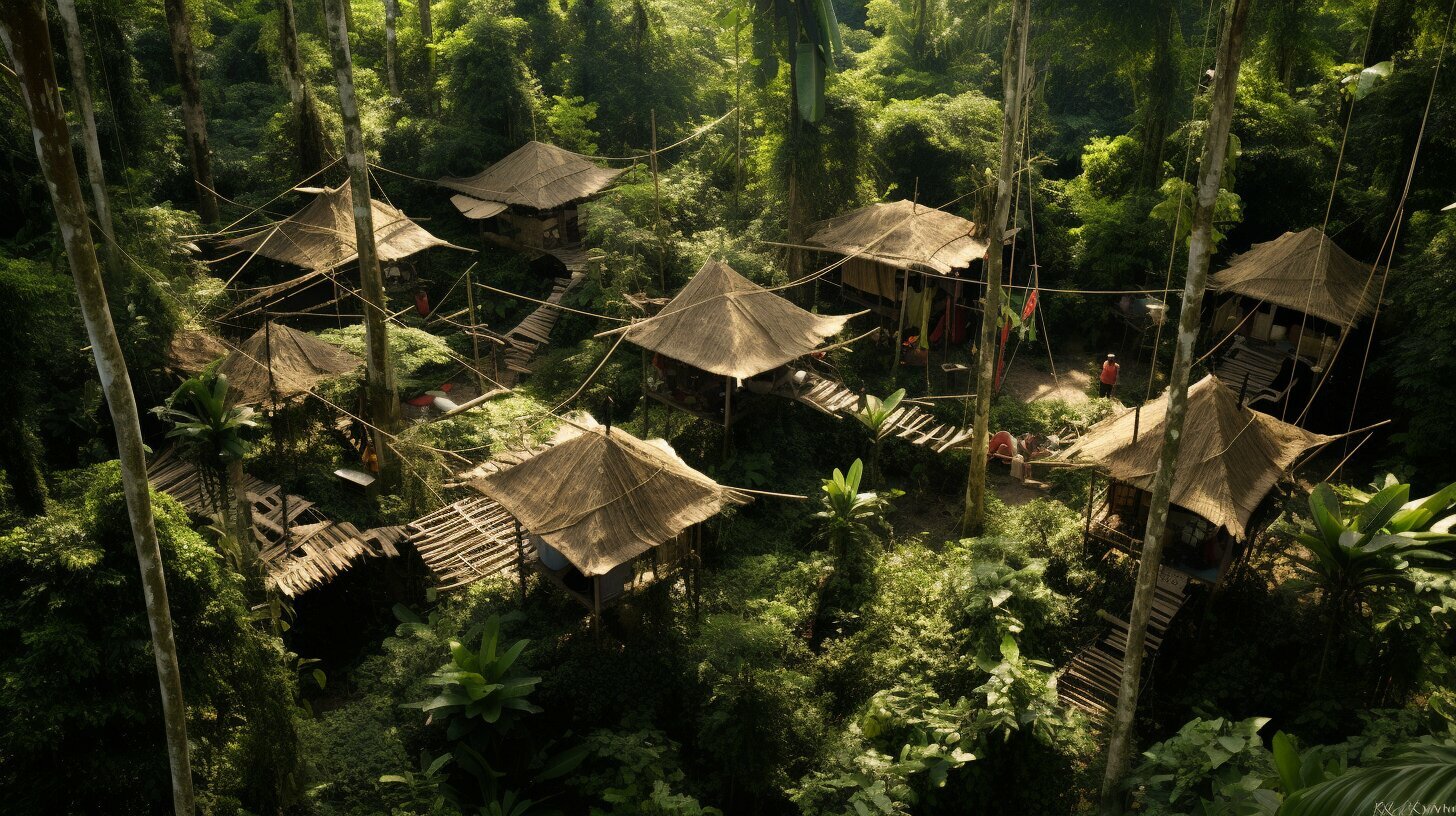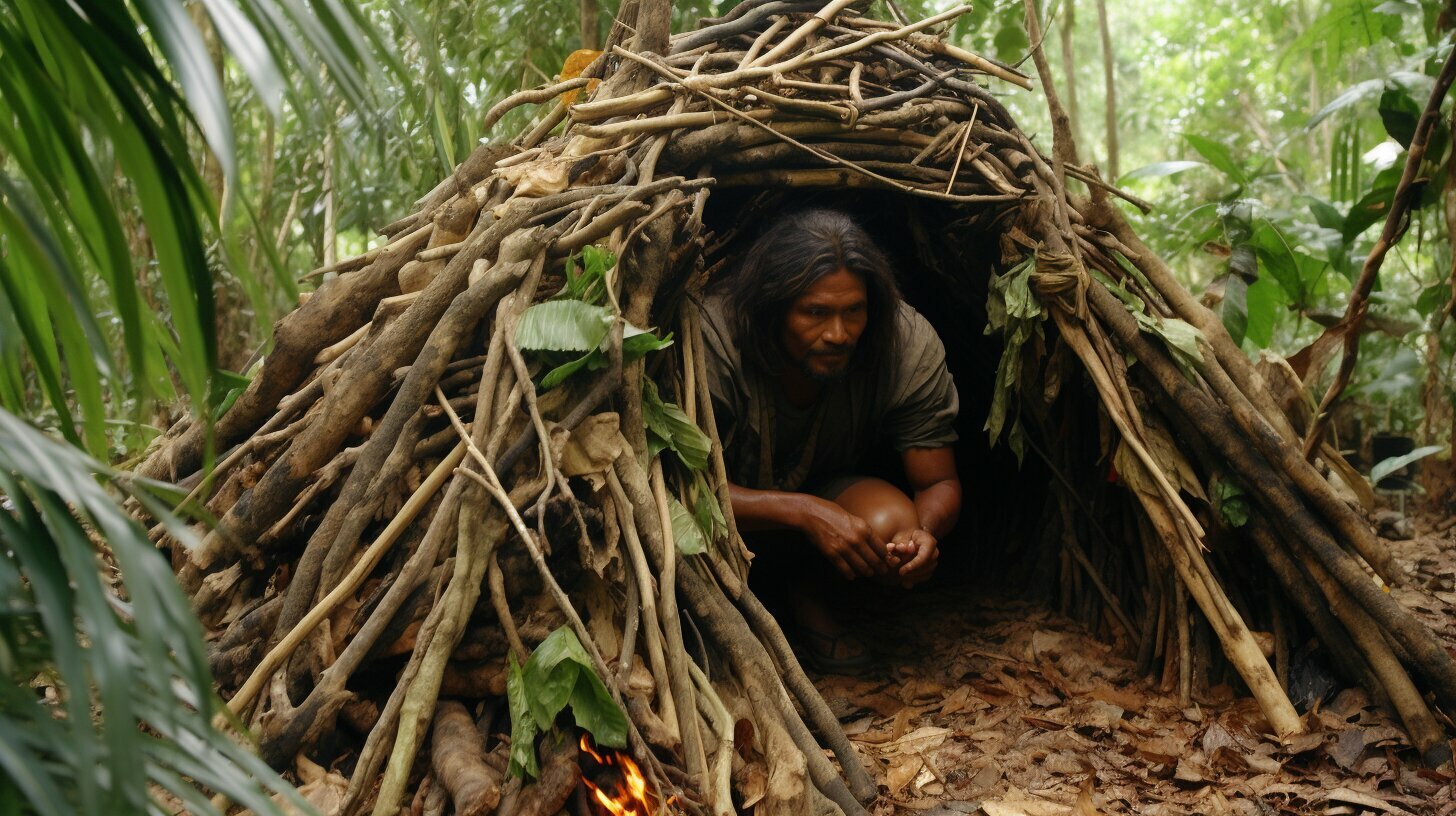In the midst of a tropical jungle or a scorching desert, you need to have the right skills to survive. From finding food and water to building shelter and navigating through the wilderness, tropical survival skills are essential for your well-being.
In this comprehensive guide, we will equip you with the necessary skills and knowledge to thrive in the challenging tropical environments. By exploring proven strategies and techniques, you can turn your experience into a remarkable success story.
Disclosure: When you buy through links on our site, we may earn an affiliate commission.
Key Takeaways
- Acquire the essential skills for tropical survival.
- Learn how to adapt to the unique challenges of tropical environments.
- Explore proven strategies for finding food, water, and shelter.
- Understand the importance of a strong survival mindset.
- Develop the necessary skills for navigating through the wilderness and encountering wildlife.
Understanding Tropical Environments: Key Factors to Consider
Surviving in hot climates requires a unique set of skills and knowledge. To succeed in tropical regions, you need to understand the essentials of tropical survival. Here are some key factors to consider:
Climate and Weather
The hot and humid climate of the tropics can be challenging to adapt to. High temperatures, intense sunlight, and heavy rainfall can all impact your survival. To prepare, ensure that you have appropriate clothing and gear that can protect you from the elements. In addition, learn how to monitor weather patterns to avoid dangerous situations.
Water Sources
In tropical regions, water can be abundant but not always safe to drink. Understanding where to find water sources and how to purify them is crucial for your survival. Consider carrying a portable water filter or water purification tablets in your survival kit.
Wildlife
Tropical environments are home to a diverse range of wildlife, including snakes, spiders, and other dangerous creatures. Learn about the common wildlife in the area you are exploring and understand how to avoid encounters. If you do come across wildlife, know how to handle the situation safely.
Food Sources
Knowing how to find food in the tropics can be a lifesaver. Edible plants and fruits are abundant in tropical regions, but not all are safe to eat. Learn how to identify safe food sources and avoid poisonous plants. Consider carrying a field guide to local plant life.
Navigation
Getting lost in the dense, tropical wilderness can be dangerous. Knowing how to navigate is essential for your survival. Consider carrying a map and compass, and learn how to use them properly. GPS devices and mobile phones can also be helpful, but always have a backup plan in case technology fails.
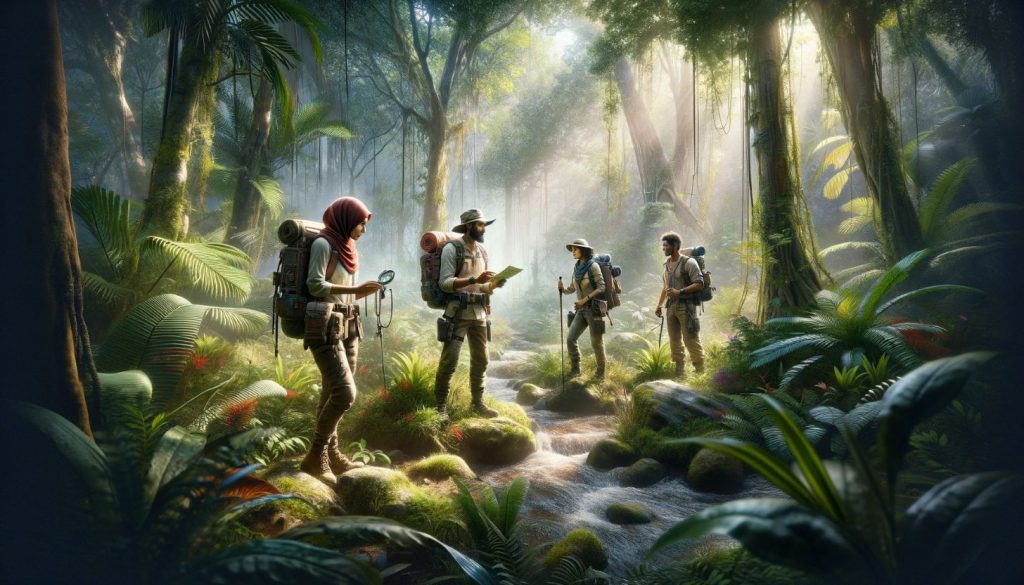
“Surviving in hot climates requires a unique set of skills and knowledge.”
Building a Strong Tropical Survival Mindset
Surviving in the jungle requires more than just physical skills. Developing a strong and resilient mindset is essential to withstand the psychological and emotional challenges that come with the territory.
Here are some jungle survival techniques to help you build mental toughness:
- Stay positive: A positive mindset can help you overcome even the most challenging situations. Focus on your strengths and believe in your ability to survive.
- Maintain your focus: In a survival situation, it’s easy to become overwhelmed by fear and anxiety. Stay focused on the task at hand and avoid dwelling on negative thoughts.
- Be adaptable: The jungle is unpredictable, and you need to be ready to adapt to changing circumstances. Keep an open mind and be willing to try new things.
- Stay calm: Panic can be your worst enemy in the jungle. Practice deep breathing and other relaxation techniques to keep yourself calm and focused.
- Train your mind: Just like physical training, mental training is essential for survival. Practice meditation, visualization, and other techniques to help you stay calm and focused under pressure.
Tropical survival training can also help you build a strong mindset. Enrolling in a survival course can teach you valuable skills, build your confidence, and give you the opportunity to practice what you’ve learned in a controlled environment.
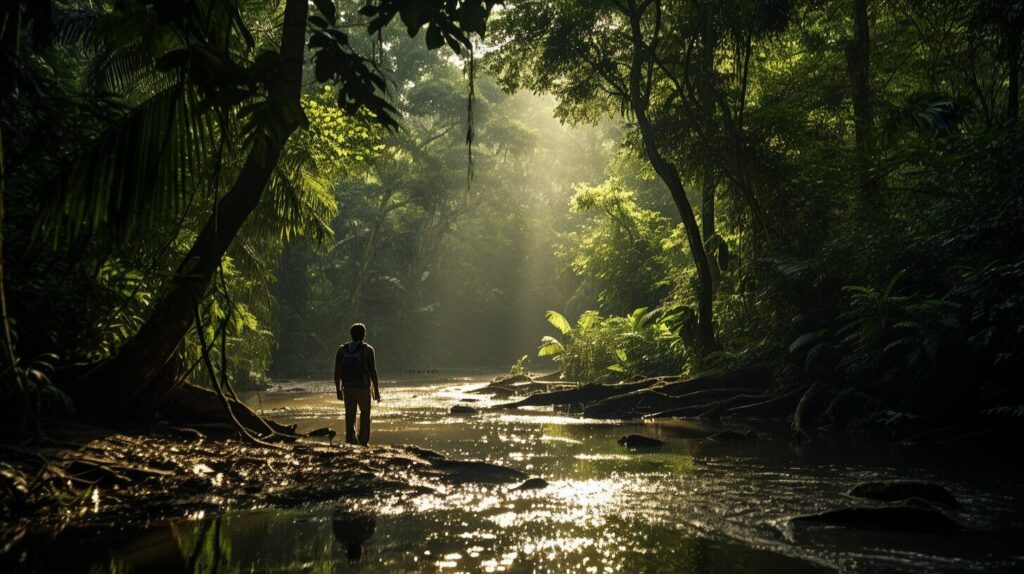
“Survival in the jungle is as much about mental toughness as it is about physical skill.” – Bear Grylls
Remember, building a strong mindset takes time and practice. By incorporating these jungle survival techniques and seeking out additional training, you can develop the mental toughness you need to survive in the tropics.
Essential Tropical Survival Skills: Food and Water Procurement
When it comes to surviving in the tropics, knowing how to procure food and water is crucial. Here are some survival tips for tropical environments to help you stay nourished and hydrated:
Finding Safe Water Sources
In tropical regions, water sources can be contaminated with bacteria, viruses, and parasites. It’s essential to know how to find safe water sources and how to purify water if necessary.
- Look for moving water sources, such as streams or rivers, as they are less likely to be contaminated than stagnant water sources.
- Use a water filter or purifier to eliminate harmful bacteria and viruses. If you don’t have access to these tools, you can boil water to kill bacteria and viruses.
- If you have no other options, you can collect rainwater. However, you should still purify it before drinking.
Identifying Edible Plants
In tropical regions, there are many edible plants that can provide vital nutrients. However, it’s essential to know which plants are safe to eat.
| Plant Name | Edible Parts |
|---|---|
| Coconut | Fruit, water, and meat |
| Papaya | Fruit and leaves |
| Banana | Fruit and flowers |
| Pineapple | Fruit |
These are just a few examples of edible plants found in tropical regions. It’s essential to research and identify local plants to ensure they are safe to eat.
Hunting and Fishing
Another way to procure food in the tropics is through hunting and fishing. Here are some survival tips for tropical environments when it comes to hunting and fishing:
- Use traps and snares to catch small game, such as birds or rodents.
- Use a fishing net or spear to catch fish.
- Avoid hunting or fishing in contaminated water sources.
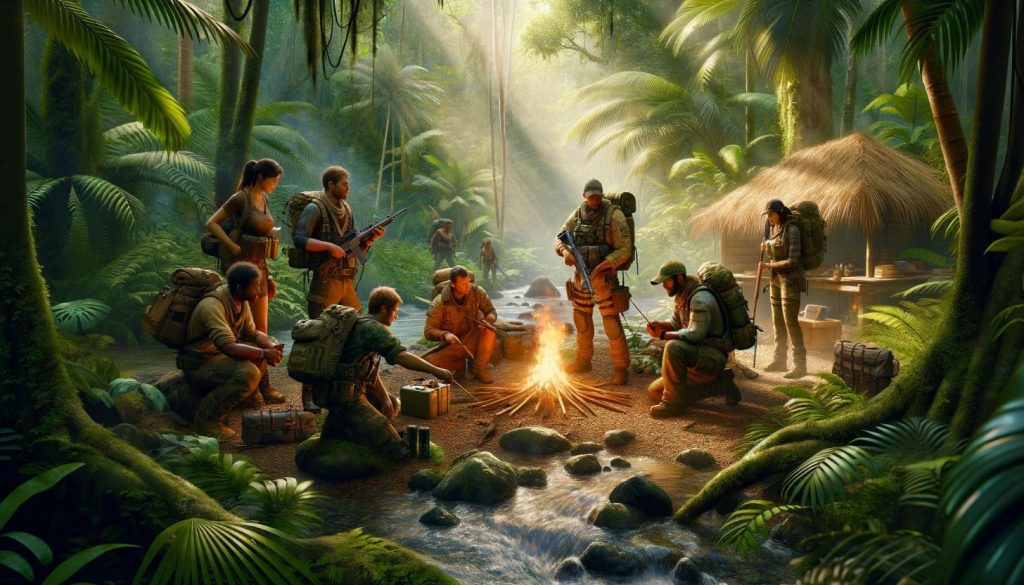
“Surviving in the tropics requires practical skills and knowledge. Knowing how to find safe water sources, identify edible plants, and hunt or fish are essential survival tips for tropical environments.”
Shelter and Fire Building in Tropical Regions
When it comes to wilderness survival in tropical regions, one of the most critical skills to master is building shelter and starting a fire. These two elements are essential for protecting yourself from the elements and providing warmth and light. Let’s explore some key techniques for building effective shelter and starting a fire in tropical regions.
Shelter Building
When building shelter in tropical regions, it is crucial to consider the unique characteristics of the environment. Dense foliage, high humidity, and intense heat require careful planning and adaptation to create a protective structure. Here are some key tips for building shelter in the tropics:
- Choose a location with flat ground, away from potential hazards like falling branches or flash floods.
- Look for natural features to incorporate into your shelter, such as trees or rocks.
- Use lightweight materials, such as leaves or vines, to construct your shelter.
- Ensure proper ventilation to avoid moisture buildup and allow air to circulate.
A well-built shelter can provide protection from the elements and help you conserve your energy. Take a look at this table for a comparison of different types of tropical shelters:
| Shelter Type | Advantages | Disadvantages |
|---|---|---|
| Lean-To | Quick and easy to construct | Poor protection from high winds |
| A-Frame | Sturdy and provides good protection from the elements | Takes longer to construct and requires more materials |
| Round Lodge | Spacious and provides good protection from the elements | Takes a lot of time and materials to construct |
Remember to choose the type of shelter that best suits your situation and available resources.
Fire Building
Starting a fire in tropical regions can be a challenge due to high humidity and limited dry materials. However, it is essential for cooking, purifying water, and providing warmth and light. Here are some tips for starting a fire in the tropics:
- Look for natural kindling materials, such as dry leaves or bark.
- Use a firestarter, such as matches or a lighter, to ignite the kindling.
- Build your fire on a dry surface to prevent it from being extinguished by moisture.
- Ensure proper ventilation to avoid smoke buildup.

By mastering the skills of shelter and fire building, you can increase your chances of survival in challenging tropical environments. Remember to always prioritize safety and stay adaptable to your surroundings.
Navigating the Tropical Wilderness: Orientation and Navigation
When it comes to navigating the dense tropical wilderness, having the right tools and knowledge is paramount. As you venture into the unfamiliar territory, you need to be prepared to handle any unexpected challenges that might come your way.
Tropical Survival Gear
Start by equipping yourself with reliable tropical survival gear. Here are some essential tools that you must have in your arsenal:
| Item | Purpose |
|---|---|
| Compass | Helps you determine the direction and stay on course |
| Map | Provides a detailed layout of the area and helps you locate landmarks and other reference points |
| Sunscreen | Protects your skin from the harmful UV rays of the sun |
| Insect repellent | Keeps insects and other pests at bay and lowers your risk of contracting illnesses |
| Multi-tool knife | Has multiple functions such as cutting, opening, and screwing, making it a versatile tool for various survival situations |
| LED flashlight | Provides a reliable source of light during emergencies and in low-light conditions |
| Water bottles or hydration system | Ensures you have access to clean drinking water at all times to keep yourself hydrated |
It is also vital to wear the right clothing and footwear that can withstand the heat, humidity, and rugged terrain of tropical regions. Opt for lightweight, breathable clothing made from materials that dry quickly and wick moisture away from your skin. Wear sturdy, closed-toe shoes that provide good grip and support for your feet.
Navigation Techniques
When it comes to navigation, there are several techniques you can use to find your way in the tropical wilderness. Here are some of the most effective methods:
- Using the sun: The sun can help you determine the cardinal directions. In the northern hemisphere, the sun rises in the east and sets in the west.
- Using the stars: If you’re out at night, you can use the stars to navigate. Look for the North Star (Polaris) to determine north.
- Using landmarks: Look for natural or man-made landmarks such as rivers, mountains, or buildings to orient yourself.
- Following a trail: If you come across a trail, follow it to a known destination or a landmark.
- GPS navigation: If you have a GPS device or a smartphone with GPS capabilities, use it to determine your position and navigate to your destination.
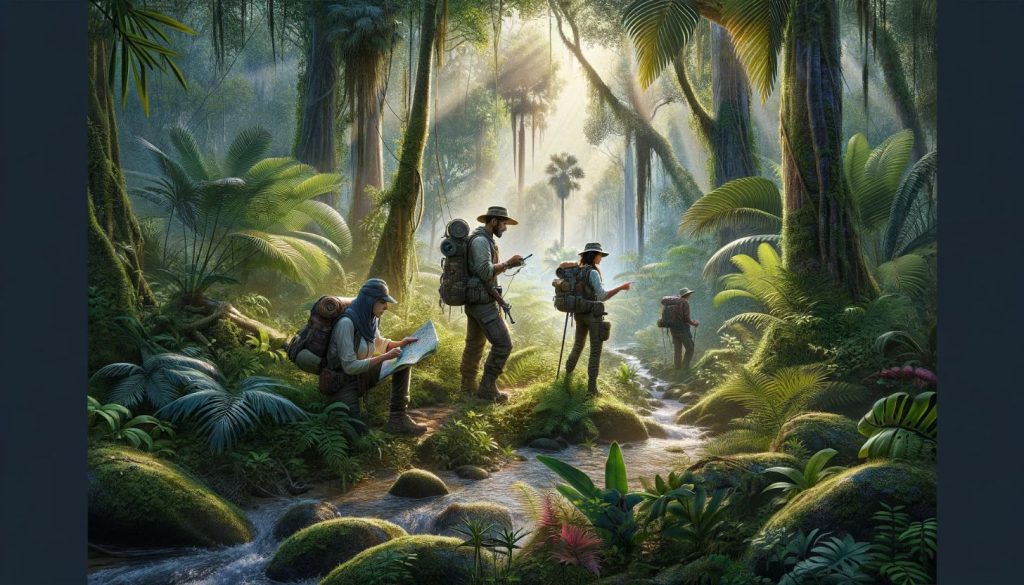
When venturing into the tropical wilderness, remember to stay alert and be aware of your surroundings. Keep your navigation tools and survival gear close at hand, and don’t be afraid to ask for help if you need it. With the right mindset, tools, and techniques, you can navigate the tropical wilderness like a pro.
Tropical First Aid and Medical Preparedness
When it comes to surviving in tropical regions, being prepared for medical emergencies is essential. You never know when you might encounter injury, illness, or venomous creatures, so it’s important to have the right tools in your tropical survival gear kit.
Here are some essential items to include in your first aid kit:
- Antiseptic wipes and ointment: to clean and disinfect wounds.
- Bandages: to cover cuts and scrapes.
- Gauze pads and tape: for larger wounds.
- Tweezers: to remove debris or splinters from wounds.
- Splint: to immobilize injured limbs.
- Medications: for pain relief and allergic reactions.
In addition to your first aid kit, it’s a good idea to carry a snakebite kit and learn how to use it properly. If you’re traveling to a remote area, consider taking a wilderness first aid course to prepare yourself.
It’s essential to be aware of common tropical ailments, such as dengue fever, malaria, and Zika, and take preventative measures to protect yourself. Wear long-sleeved shirts and pants, use insect repellent, and sleep under mosquito nets to avoid mosquito bites. Be cautious of contaminated food and water sources, and carry water purification tablets or a water filter in case of emergency.
Remember, prevention is key, so take necessary precautions to stay healthy and avoid injury in tropical environments.
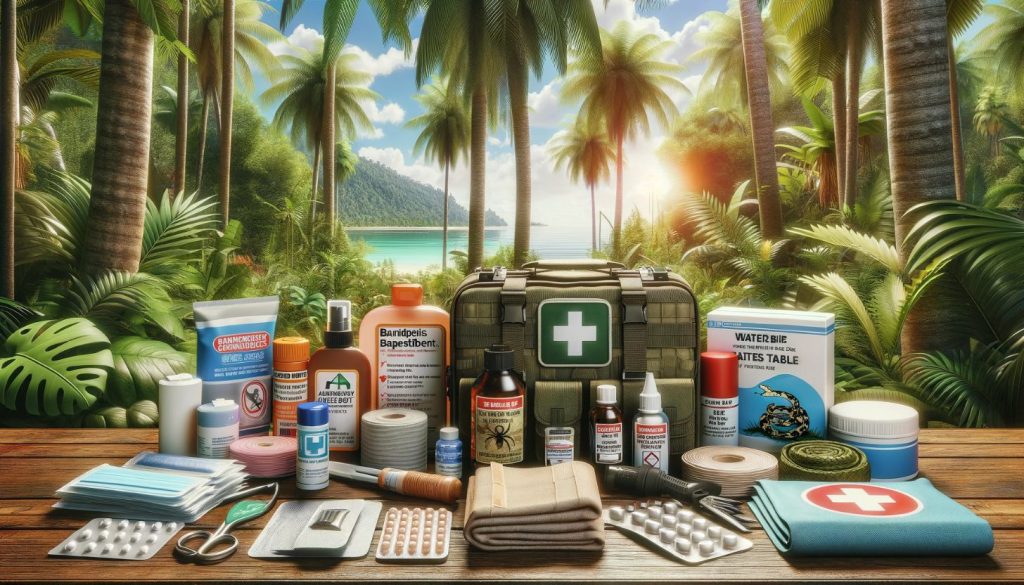
Surviving Tropical Wildlife Encounters
Encountering wildlife in tropical regions can be an exhilarating experience. However, it can also be dangerous if you do not know how to handle the encounter. Here are some essential survival tips to consider:
Be Aware of Your Surroundings
Always stay alert and be aware of your surroundings. Learn about the common wildlife in the area you are in and their behaviors. This knowledge can help you anticipate and avoid potential encounters.
Make Noise
Most animals will avoid humans if they hear them coming. Make noise when you are traveling in the wilderness to alert any wildlife in the area of your presence. Clap your hands, sing, or talk loudly to let them know you are there.
Do Not Approach Wildlife
It may be tempting to approach or feed wildlife, but this is a dangerous practice. Respect their space and keep a safe distance. Do not attempt to touch or interact with any animals you encounter.
Know What To Do If You Encounter Dangerous Animals
Some animals, such as snakes and spiders, can be venomous and pose a significant threat to humans. Research the types of dangerous animals in the region you are exploring and learn the appropriate actions to take if you encounter them.
If you encounter a dangerous animal, stay calm and slowly back away. Do not run or make sudden movements. If the animal appears aggressive, make yourself appear larger by raising your arms and standing on your tiptoes. Loudly shout or use a whistle to deter the animal.
Carry Appropriate Gear
Carry appropriate gear with you to protect yourself from potential wildlife encounters. A basic survival kit should include a whistle, bear spray, a knife, and an emergency blanket.
Remember, while wildlife encounters can be dangerous, they can also be a unique and memorable experience. Stay informed, be prepared, and enjoy your tropical adventure.

Conclusion
As you wrap up your journey of unlocking tropical survival skills, remember that it takes a combination of knowledge, preparation, and adaptability to thrive in challenging tropical environments. By understanding the unique challenges of the tropics, developing a resilient mindset, and mastering essential skills like food and water procurement, shelter building, navigation, first aid, and wildlife encounters, you can confidently navigate and succeed in the tropics.
Whether you are exploring the lush rainforests of South America, trekking through the savannas of Africa, or navigating remote islands in Southeast Asia, the skills and strategies you have learned in this guide will help you face any tropical survival challenge that comes your way.
So, go ahead and embrace the adventure, armed with your newfound knowledge and skills. Remember to keep your tropical survival gear well-stocked and to stay calm and focused in challenging situations. By doing so, you can turn your tropical survival experience into a remarkable success story.
FAQ
What are tropical survival skills?
Tropical survival skills refer to the techniques and knowledge necessary to survive and thrive in challenging tropical environments. These skills involve understanding the unique challenges of the tropics, such as extreme heat, dense vegetation, and potential wildlife encounters, and adapting to these conditions.
Why is it important to understand tropical environments?
Understanding tropical environments is crucial because it allows you to adapt to the distinct challenges they present. By grasping the essentials of tropical survival, such as knowing how to find food and water sources, building shelters, and navigating the wilderness, you increase your chances of staying safe and successfully enduring in these environments.
How can I develop a strong tropical survival mindset?
Building a strong tropical survival mindset involves training your mind to handle the psychological and emotional aspects of surviving in tropical regions. This can be achieved through practicing resilience, staying positive, and learning jungle survival techniques. A strong mindset will help you stay focused, make rational decisions, and overcome obstacles in challenging situations.
What are essential tropical survival skills for food and water procurement?
Essential tropical survival skills for food and water procurement include knowing how to identify edible plants, finding and purifying water sources, and understanding the principles of safe food preparation. Learning these skills will enable you to sustain yourself with adequate nutrition and hydration in tropical environments.
How do I build shelters and start fires in tropical regions?
Building effective shelters and starting fires in tropical regions require knowledge of local resources and suitable techniques. You will learn how to select the right materials, construct various types of shelters, and safely build fires for warmth and cooking purposes. Mastering these skills will provide you with protection from the elements and essential comfort in the tropics.
What tools and techniques can help me navigate the tropical wilderness?
Navigating the tropical wilderness can be facilitated by using tools such as compasses, maps, and GPS devices. Additionally, learning natural navigation methods, such as studying the sun’s position and tracking landmarks, can enhance your orientation skills in tropical environments. Having the right survival gear, such as a reliable backpack and appropriate clothing, is also essential for successful navigation.
What first aid techniques and medical preparedness should I know for tropical environments?
In tropical environments, it is important to be prepared for common ailments and injuries. Learning basic first aid techniques, such as treating wounds, recognizing symptoms of dehydration or heat stroke, and administering necessary medications, can be crucial for your well-being. Carrying a well-stocked first aid kit that includes items specific to tropical regions is also advisable.
How can I safely handle encounters with tropical wildlife?
Safely handling encounters with tropical wildlife involves understanding the behavior and habits of different creatures. Learning how to minimize risks and effectively respond to encounters with snakes, insects, or larger animals is essential for your safety. Techniques such as making noise to alert animals to your presence, avoiding sudden movements, and properly storing food can help prevent potentially dangerous situations.
What should I keep in mind when mastering tropical survival skills?
When mastering tropical survival skills, it is important to remember that knowledge, preparation, and adaptability are key. Understanding the unique challenges of the tropics, acquiring the necessary skills, and being prepared with the right equipment and supplies will increase your chances of thriving in tropical environments. Embrace the adventure and turn your tropical survival experience into a remarkable success story.


